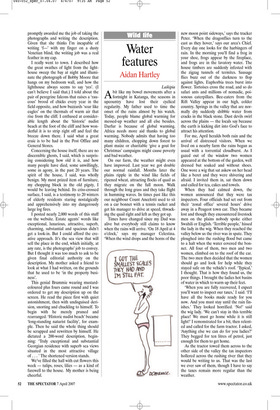Water features
Aidan Hartley
Laikipia
Abit like my bowel movements after a fortnight in Katanga, the seasons in upcountry have lost their cyclical regularity. My father used to time the onset of the rains almost by his watch. Today, people blame global warming for messed-up weather and all else besides. Darfur is because of global warming. Africa needs more aid thanks to global warming. Nobody admits that having too many children, chopping down forest to plant maize or charitable ‘give a goat for Christmas’ campaigns might cause poverty and bad weather.
On our farm, the weather might even have improved. Last year we got double our normal rainfall. Months later the plains ripple in the wind like fields of ripened wheat, attracting flocks of quail as they migrate on the full moon. Walk through the long grass and they take flight in humming waves. In times past like this our neighbour Count Ancelotti used to sit on a car bonnet with a tennis racket and get his manager to drive at speed, thwacking the quail right and left as they got up.
Times have changed since my Dad was alive but everybody still claims to know when the rains will arrive. ‘On 18 April at 4 o’clock,’ says my manager Celestina. ‘When the wind drops and the horns of the new moon point sideways,’ says the tracker Peter. ‘When the dragonflies turn to the east as they hover,’ says our area’s Chief. Every day one looks for the harbingers of rain. In the morning you’ll find a frog in your shoe, frogs appear by the fireplace, and frogs are in the lavatory water. The house timbers are suddenly infested with the zigzag tunnels of termites. Sausage flies buzz out of the darkness to flop against lights. Euphorbia trees burst into flower. Tortoises cross the road, and so do safari ants and millions of nomadic, poisonous caterpillars. Bee-eaters from the Rift Valley appear in our high, colder country. Springs in the valley that are normally dry suddenly dribble water from cracks in the black stone. Dust devils swirl across the plains — the locals say because the earth is kicking dirt into God’s face to attract his attention.
For me, April heralds both rain and the arrival of distressed visitors. When we lived on a nearby farm the rains began as usual with a torrential cloudburst. As I gazed out of the window two women appeared at the bottom of the garden, well dressed but soaked and without shoes. One wore a wig that sat askew on her head like a beret and they were shivering and afraid. I invited them in, sat them down and called for tea, cakes and towels.
When they had calmed down, the women announced that they were tax inspectors. Four officials had set out from their ‘zonal office’ several hours’ drive away in a Peugeot town car. They became lost and though they encountered livestock men on the plains nobody spoke either Swahili or English. ‘Terrible people,’ hissed the lady in the wig. When they reached the valley below us the river was in spate. They ploughed into the rushing flood but came to a halt when the water covered the bonnet. All four of them, two men and two women, climbed on to the roof of the car. The two men then decided that the women should go and look for help while they stayed safe on the vehicle’s roof. ‘Typical,’ I thought. That is how they found us, the poor things. I brought the ladies hot basins of water in which to warm up their feet.
‘When you are fully recovered, I expect you’ll want to inspect our taxes,’ I said. ‘I’ll have all the books made ready for you now. And you must stay until the rain finishes.’ They looked horrified. ‘No!’ said the wig lady. ‘We can’t stay in this terrible place! We must go home while it is still light!’ I remonstrated for a bit, then relented and called for the farm tractor. I asked, ‘Anything else we can do for you ladies?’ They begged for ten litres of petrol, just enough for them to get home.
As the tractor towed them across to the other side of the valley the tax inspectors hollered across the rushing river that they would be writing to us. That was the last we ever saw of them, though I have to say the taxes remain more regular than the weather.


































































 Previous page
Previous page